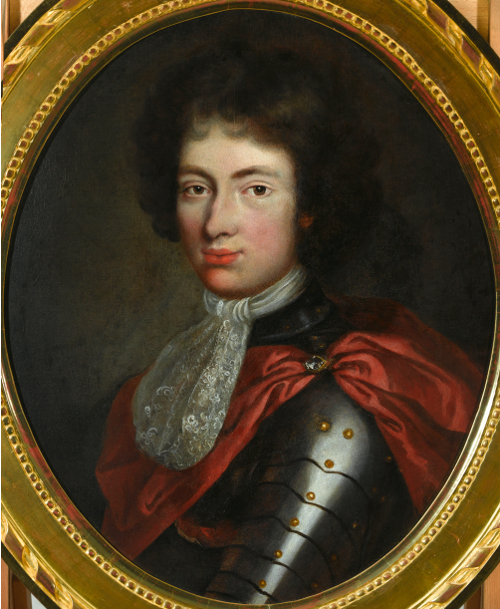
The calendar, published in 1676, or rather the attached book of premonitions with the Janina coat of arms and a long Latin inscription “For Jakub, the first-born son of my Lord, the most dignified, the most powerful and the invincible Jan III”, signed by the author of both the calendar and the book of premonitions, Jan Gostumiowski in Krakow. 15th August 1676 was an exceptional day, and both the inscription, as well as its form were also exceptional.
The details of the order are unknown, same as the name of the person who ordered the book. Perhaps, as it was the case with other similar transactions, it was all about the typical relations between the author and his (perhaps even financial) protector and the person to whom the piece was dedicated. Jan Gostumiowski, connected to the Jagiellonian University published his calendars at least since the 1660s. Inscriptions in other calendars prove that the author was well acquainted with many high-born patrons. He also tried to make his calendars stand out with their erudition by, among others, giving them titles in Greek. The position of the author was therefore good for a client such as the eldest son of the king.
The calendars dedicated to the high-born were not uncommon in the second half of the 17th century. The patronage over the authors of the calendars were not uncommon either in the Sobieski family tradition. This dedication is, however, exceptional because of its language, as well as its content. The fact that it was written in Latin was not a single exception, however the glory of the family, which often was the subject of the dedication was far more often formulated in the more accessible Polish language. There was, however, an important reason for which the author decided to use Latin, the language of the scientific and political discourse – he wanted to show Jakub Sobieski as a man well-versed in the art of ruling, a man of many talents whose knowledge would allow him to become the ruler of the country. Undoubtedly, describing Jakub as a princeps was also rich in contexts. The Latin words “a primogenitus filius” was ambiguous, as it could mean the eldest son in the family, as well as the son predestined to take the throne. Also the political texts in the book of premonitions indicated that Jakub was not only prepared to assume the leadership in Poland, he also excelled in the erudition that every politician needed – he was able to incorporate both science of astronomy, as well as astrology as the tools of analysis.
The calendar published by Gostumiowski was an initiative to build the political career of Jakub Ludwig, the eldest son of Jan III and second in the line of succession to the Polish crown in the Sobieski family. His middle name, according to his mother’s intention was picked in order to remind of the connection to Louis XIV, could not bring him sympathy in a country where the nobility ostensibly claimed aversion towards other political systems, and any way of electing the king, other than free election. The calendar published in 1676 with a dedicated book of premonitions was, similarly to the school dramas prepared by the noble, often high-born students, a way to gain public support using the means that functioned well in the households as well as in the families of the nobility. According to the handbooks on proper household management by Jan Jakub Haur the calendar was the staple of the nobleman’s library, moreover it is worth noting that it was a typical example of utilitarian literature, gathered throughout the years, sometimes gathered in collections and passed on with the entire library.
The dedication written by Jan Gostumiowski therefore can be considered as yet another eulogy that emphasised the virtues of the character and the ability to rule, similar to the 1682 play Sława kwitnącej młodości (The glory of flourishing youth), presented by the students of the Jesuit college in Jarosław, and in school play from 1684 Triumphus orbis christianus in the Vilnius college, and then yet again in 1693, in the foreword to the Oeconomiej ziemiańskiej (Economy of the ziemia) by Jakub Haur, who wrote about the Prince “to everyone’s amazement (…) not only the knights’ hearts does he inspire, but his own deeds shine brightly as well”. Gostumiewski’s dedication in the calendar thus opens a new period in the history of calendar literature, in which even during the reign of the Wettins the royal family will have a more prominent, and often the very first place.
Translation: Lingua Lab
We would like to inform that for the purpose of optimisation of content available on our website and its customisation according to your needs, we use information stored by means of cookies on the Users' end devices. You can control cookies by means of your Internet browser settings. Further use of our website without change of the browser settings means that you accept the use of cookies. For more information on cookies used by us and to feel comfortable about this subject, please familiarise yourselves with our Privacy Policy.
✓ I understand